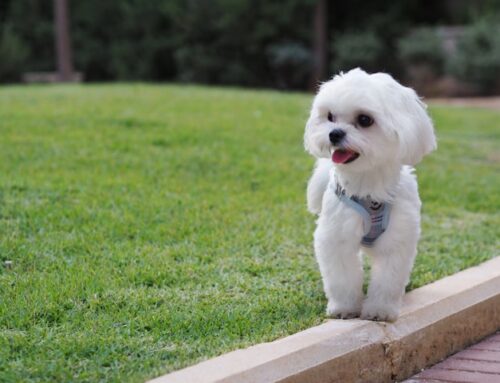Overview
Introduction: Why Do Dogs Love Tennis Balls
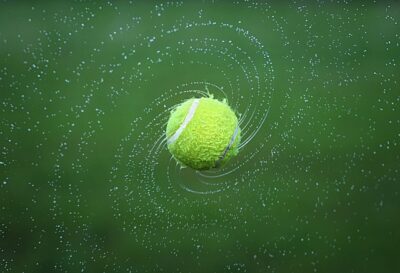
Dogs and Tennis Balls: A Match Made in Canine Heaven
Have you ever wondered why your furry companion goes wild at the sight of a tennis ball? The answer to this canine fascination might be more intriguing than you think.
In 2024, as we delve deeper into understanding our four-legged friends, the question “Why do dogs love tennis balls?” and “Why is my dog obsessed with tennis balls?” is more relevant than ever.
From their unrelenting chase to their unwavering grip, the obsession with tennis balls reveals a captivating aspect of canine behavior.
Join us as we uncover the science behind this phenomenon and explore the reasons behind your dog’s unbridled love for tennis balls.
The Irresistible Bond: Play Fetch
From the moment a dog enters our lives, a bond is formed that is unlike any other. This bond is built on trust, love, and shared experiences. Among these experiences, playing ball stands out as a favorite pastime for both dogs and their human companions.
Why do dogs love tennis balls? And why is my dog obsessed with tennis balls? These questions can be answered by understanding the primal instincts that drive dogs to play and bond with their human companions. Playing ball taps into these instincts, providing physical exercise and mental stimulation that are essential for a dog’s well-being.
As you toss a tennis ball for your furry friend, remember that this simple act is more than just a game; it’s a meaningful interaction that strengthens your bond. Embrace their love for tennis balls, cherish these moments of play, and celebrate the unique and beautiful relationship between dogs and humans.
The Origin of the Obsession: Why Do Dogs Love Tennis Balls
A Brief History of Tennis Balls for Dogs
The love affair between dogs and tennis balls has a long history. It all started when tennis balls were repurposed to entertain our four-legged friends. These versatile balls became a source of joy for dogs, triggering their natural instincts to chase and retrieve.
The Evolution of Canine Play
Over time, the way dogs play has evolved. From their wild ancestors hunting for prey to today’s domesticated dogs, the instinct to chase and retrieve remains deeply ingrained. Tennis balls perfectly tap into this instinct, providing hours of fun for our canine companions.
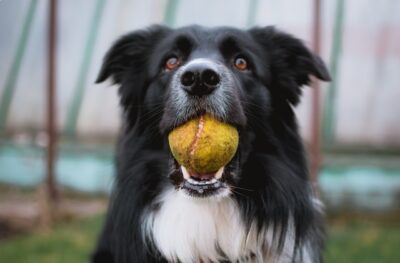
The Sights and Sounds: The Visual Attraction
The Color Connection
Dogs are not colorblind; they see a limited spectrum of colors. However, the vibrant color of tennis balls, often green or yellow, is easily distinguishable to them. This color contrast enhances their visual interest and makes the game of fetch all the more exciting.
Bouncing and Rolling: The Chase
The unpredictable bouncing and rolling of a tennis ball add an element of surprise to the game. Dogs love the challenge of chasing a ball in motion, stimulating their hunting instincts.
The Auditory Allure: The Squeak Factor
Many tennis balls come with a squeaker inside, and dogs are drawn to the sound it makes. The squeak mimics the noise of prey, triggering a response that compels them to investigate and play.
Sound Sensitivity in Dogs
Dogs have a keen sense of hearing, and the sound of a tennis ball being thrown or bounced excites them. It’s like music to their ears, signaling playtime and adventure.

The Scents that Speak: Why Do Dogs Love Tennis Balls
The Power of Smell
Tennis balls often retain scents from their environment, including the places they’ve been and the hands that have touched them. Dogs have an incredible sense of smell, and this added olfactory dimension adds to the allure of tennis balls.
Tennis Ball Material and Odor Retention
The materials used in tennis balls can absorb and hold onto scents, creating a unique sensory experience for dogs during play.
Dogs’ Incredible Olfactory Abilities
Dogs’ noses are estimated to be tens of thousands of times more sensitive than humans’. This heightened sense of smell intensifies their connection to the world around them, including their beloved tennis balls.
The Texture Temptation: Why Do Dogs Love Tennis Balls
The Pleasure of Texture
Tennis balls have a distinctive texture that dogs find appealing. The combination of a soft exterior and a firm core provides the perfect balance for biting and carrying.
The Crunch and Squeak
When dogs bite down on a tennis ball, it produces a satisfying crunch. The sensation of biting into the ball, combined with the squeak, makes for a truly enjoyable experience.
Dental Benefits
The act of chewing on a tennis ball can also have dental benefits for dogs. It can help clean their teeth and gums, promoting better oral health.
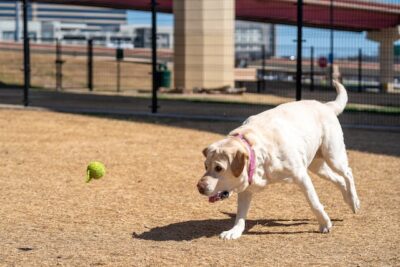
The Playtime Psychology: Why Do Dogs Love Tennis Balls
Instinctual Play Behavior
The playtime psychology behind why dogs love tennis balls is rooted in instinctual play behavior. Fetch mimics the natural hunting and retrieving instincts of dogs, providing them with a rewarding and fulfilling activity.
This instinctual behavior explains why dogs are often obsessed with tennis balls, as it satisfies their innate need to chase, catch, and carry objects.
Canine Emotional Connection
The playtime psychology behind why dogs love tennis balls is also linked to a canine emotional connection. Playing fetch creates a positive association and strengthens the bond between dogs and their owners.
This emotional connection explains why dogs may become obsessed with tennis balls, as it represents a fun and rewarding interaction with their human companions.
The Role of Dopamine
The playtime psychology behind why do dogs love tennis balls involves the role of dopamine, a neurotransmitter associated with pleasure and reward.
When dogs play fetch and successfully retrieve a tennis ball, their brains release dopamine, creating a sense of enjoyment and satisfaction.
This rewarding experience can lead to a dog’s obsession with tennis balls, as they seek to replicate the pleasurable feeling associated with playing fetch.

The Training and Reward Aspect: Why Do Dogs Love Tennis Balls
Positive Reinforcement
For dogs, the love for tennis balls goes beyond play; it’s also about positive reinforcement.
Using tennis balls as a reward during training sessions can be highly effective, as dogs associate fetching the ball with a sense of accomplishment and pleasure.
This positive reinforcement strengthens desired behaviors and fosters a deeper bond between dogs and their owners.
Building Obedience
Dogs’ obsession with tennis balls can be harnessed to build obedience and reinforce training. The anticipation of fetching a tennis ball serves as a powerful motivator for dogs, encouraging them to follow commands and exhibit obedient behavior.
Using tennis balls as a reward helps dogs associate good behavior with positive outcomes, making training sessions more effective and enjoyable for both dogs and their owners.
The Joy of Retrieving
Dogs have an innate desire to retrieve objects. Fetching a tennis ball fulfills this desire and provides a sense of accomplishment for them.
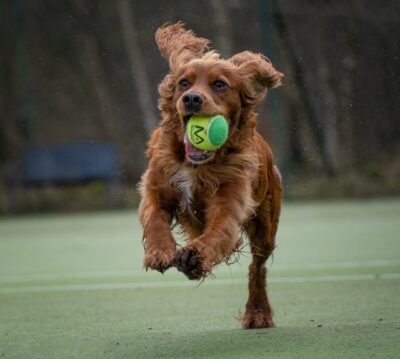
The Physical Benefits: Why Do Dogs Love Tennis Balls
Exercise and Health
The physical benefits of playing with tennis balls contribute to why dogs love them. Fetch provides dogs with essential exercise, helping to maintain their health and vitality.
This activity also stimulates their mind, fulfilling their natural instincts and explaining why they may become obsessed with tennis balls.
Cardiovascular Health
The physical benefits of playing with tennis balls extend to cardiovascular health, which helps explain why dogs love them.
Fetch provides dogs with aerobic exercise, promoting a healthy heart and circulation. This activity also helps maintain a healthy weight and reduces the risk of obesity-related health issues.
Weight Management
The physical benefits of playing with tennis balls include weight management, which contributes to why dogs love them. Fetch provides dogs with a fun and active way to burn calories, helping them maintain a healthy weight.
This activity also promotes muscle tone and overall fitness, which can reduce the risk of obesity-related health issues.
The Social Interaction: Why Do Dogs Love Tennis Balls
Playing with Humans
The social interaction between dogs and humans helps explain why dogs love tennis balls and why they may become obsessed with them.
Playing fetch not only strengthens the bond between dogs and their human companions but also satisfies dogs’ natural need for companionship and physical activity.
This shared activity taps into dogs’ innate instincts, providing mental and physical stimulation that contributes to their love for tennis balls.
Canine Camaraderie
The social interaction between dogs and their human companions is a key factor in why dogs love tennis balls. Playing fetch fosters a bond between them, fulfilling a deep need for companionship and activity.
This shared activity taps into dogs’ innate instincts, which helps explain why they are often obsessed with tennis balls.

Why is my Dog Obsessed with Tennis Balls: The Risks and Safety Concerns
Puppyhood to Adulthood
Understanding why dogs love tennis balls and why your dog is obsessed with them is crucial for their safety. While tennis balls are a popular toy, they can pose risks, especially as your dog transitions from puppyhood to adulthood.
Chewing on tennis balls can lead to dental issues, and swallowing or choking hazards if the ball becomes damaged. Regularly inspecting and replacing worn-out tennis balls can help prevent these risks and ensure your dog’s safety during playtime.
The Senior Years
As dogs age, their obsession with tennis balls may persist, but their physical abilities and dental health can change. It’s important to be mindful of these changes and adjust their play accordingly.
Older dogs may have more fragile teeth and jaws, so using softer balls or limiting intense play can help prevent dental injuries. Supervision during playtime remains crucial to ensure their safety and enjoyment.
Choking Hazards
Despite their love for tennis balls, dogs can accidentally swallow or choke on them, especially if the ball is old or damaged. It’s important to regularly inspect tennis balls for signs of wear and tear and replace them when necessary.
Supervising your dog during play and using appropriately sized balls can help reduce the risk of choking hazards and ensure a safe playtime experience.
Dental Health
While dogs love tennis balls, the repetitive chewing and fetching can lead to dental issues. The abrasive texture of tennis balls can wear down tooth enamel over time, increasing the risk of tooth decay and gum disease.
Regular dental check-ups and using dental-safe toys can help mitigate these risks and keep your dog’s teeth healthy.
Overexertion
While dogs love chasing tennis balls, it’s important to prevent overexertion, especially in hot weather or for senior dogs. Overzealous play can lead to exhaustion, dehydration, and even heatstroke.
Monitor your dog’s activity level and take regular breaks to ensure they don’t overexert themselves during playtime.
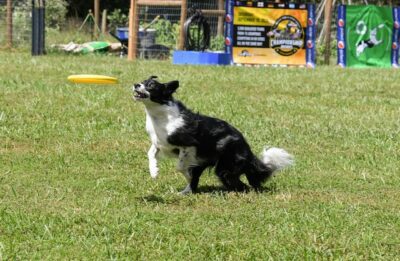
The Alternatives and Variations
Other Fetch Toys
While tennis balls are a classic favorite, there are other fetch toys available that can provide variety and excitement during playtime.
Specialty Tennis Balls
Specialty tennis balls, designed for durability and safety, are available for dogs that are particularly enthusiastic fetch players.
DIY Tennis Ball Alternatives
For the creative dog owner, making DIY tennis ball alternatives can add a personal touch to playtime while ensuring safety and enjoyment.
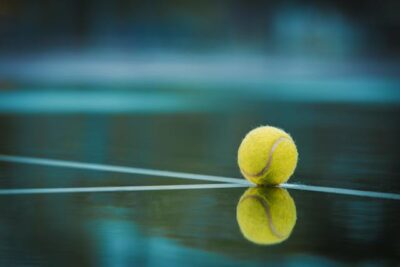
The Environmental Impact and Controversy: Tennis Ball Dyes and Chemicals
Sustainable Play
As responsible pet owners, it’s crucial to consider the environmental impact of our dog’s playtime. Choosing eco-friendly tennis ball options can contribute to a greener planet.
Disposal and Recycling
When tennis balls reach the end of their life cycle, proper disposal and recycling are essential to reduce environmental waste.
Safe Tennis Balls for Dogs
The safety of tennis balls is a topic of concern for many dog owners. It’s essential to choose tennis balls that are free from harmful dyes and chemicals to ensure the well-being of our pets.
Identifying Harmful Additives
Awareness of the potential dangers associated with certain tennis ball additives is crucial. Responsible pet owners should educate themselves and make informed choices.

The Benefits for Dog Owners
Bonding Opportunities
Playing fetch with tennis balls provides precious moments of bonding between dogs and their owners. It’s a time for shared laughter and joy.
Stress Relief
For dog owners, the act of playing fetch can be a stress-relieving experience. It’s a chance to unwind and focus on the simple pleasures of life.
Conclusion: Why Do Dogs Love Tennis Balls
As we conclude our exploration into why dogs love tennis balls, it’s clear that this seemingly simple plaything holds a deeper significance in the canine world. The joy and excitement they experience are not just about fetching a ball but tapping into a primal instinct that drives them to play and bond with their human companions.
So, the next time you toss a tennis ball for your furry friend, remember that it’s not just a game; it’s a meaningful interaction that strengthens your bond and taps into their innate behaviors. Embrace their love for tennis balls, and cherish these moments of play, for they are a testament to the unique and beautiful relationship between dogs and humans.
Understanding why your dog is obsessed with tennis balls opens a window into their world, enriching your relationship and enhancing your appreciation for these loyal and loving creatures. If you’ve ever wondered, ‘Why do dogs love tennis balls?’ or ‘Why is my dog obsessed with tennis balls?’ the answer lies in their innate need to play and bond with you.
FAQs (Frequently Asked Questions): Why Do Dogs Love Tennis Balls
- Why do dogs love tennis balls?
- Dogs are naturally drawn to tennis balls due to their size, texture, and bounce. The bright color and movement of the ball mimic prey, triggering a dog’s instinct to chase and capture.
- Why is my dog obsessed with tennis balls?
- Your dog’s obsession with tennis balls can be attributed to a combination of factors. Firstly, the repetitive nature of fetching satisfies their natural instincts to hunt and retrieve. Secondly, the interaction with you during a game of fetch strengthens your bond and provides them with much-needed exercise and mental stimulation. Lastly, the texture and scent of tennis balls may also be appealing to your dog, further fueling their obsession.
- Are tennis balls safe for all dogs?
- Tennis balls are generally safe for most dogs, but it’s essential to monitor their condition and replace them if they become damaged.
- How do I choose the right size tennis ball for my dog?
- Select a tennis ball size that matches your dog’s mouth comfortably, ensuring they can pick it up and carry it easily.
- Can tennis balls be harmful to a dog’s teeth?
- Excessive chewing on tennis balls can lead to dental problems in some dogs. Providing dental-friendly alternatives is a good practice.
- What are the signs of tennis ball addiction in dogs?
- Signs of tennis ball addiction include excessive and obsessive behavior related to the balls, such as constant whining or an inability to focus on anything else.
- How can I break my dog’s obsession with tennis balls?
- Gradually reduce the frequency of play with tennis balls and introduce other balls or other toys to divert their attention and interests.
- What are some alternatives to tennis balls for playing fetch?
- Other fetch toys, such as rubber balls or frisbees, can provide variety and excitement during playtime.
- Are there eco-friendly tennis ball options available?
- Yes, there are eco-friendly tennis ball options made from sustainable materials that reduce environmental impact.
- Are tennis balls dangerous for dogs if they tear apart?
- Tennis balls can pose a danger if they tear apart, as dogs might ingest small pieces. It’s crucial to replace damaged tennis balls promptly to prevent any potential hazards.
- Do all dog breeds have the same effect when playing with tennis balls?
- While many breeds love playing with tennis balls, some may have a stronger affinity for them than others. It can vary based on a dog’s personality and preferences.
- Is it common for many dogs to hunt tennis balls during play?
- Yes, during play, dogs often exhibit hunting behaviors when chasing and retrieving tennis balls. This natural instinct adds to their excitement.
- How can I make my dog aware of the dangers of playing with damaged tennis balls?
- It’s essential to supervise play and teach your dog not to chew on damaged tennis balls. Redirect their attention to safe toys and reward them when they follow your guidance.
- Is it safe to use tennis balls when training my dog?
- Yes, tennis balls can be a useful tool for training, but it’s important to use them safely. Ensure that your dog doesn’t become overly obsessed with them, and use positive reinforcement techniques for effective training.
- Can certain dog breeds tear tennis balls more easily due to their breeding?
- Some breeds, due to their genetics and physical traits, may be more prone to tearing tennis balls apart. If you have a breed known for strong jaws, consider using durable, specially designed balls.
- Do tennis balls have the same effect on puppies as they do on adult dogs?
- Yes, tennis balls can be equally exciting for puppies as they are for adult dogs. However, it’s essential to choose an appropriate size and supervise play to ensure safety.
- Are there any examples of dogs becoming dangerously obsessed with tennis balls?
- While tennis ball obsession is generally harmless, there have been instances of dogs becoming excessively fixated on them. Such cases may require intervention and behavior modification by a professional veterinarian or trainer.
- Can tennis balls wear out over time, and how does this affect play?
- Yes, tennis balls can wear out with extended use, losing their bounce and texture. This may affect the excitement level during play. It’s advisable to replace old balls for a better play experience.
- Are there courses or training programs available to help dogs overcome their obsession with tennis balls?
- Yes, some professional trainers offer courses designed to address and manage obsessive behaviors in dogs, including tennis ball addiction. Consulting with a veterinarian or a certified dog trainer can provide valuable guidance.




